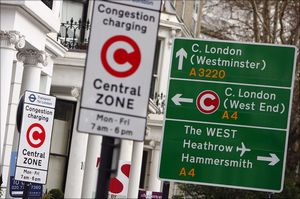|
By accessing/using The Crittenden Automotive Library/CarsAndRacingStuff.com, you signify your agreement with the Terms of Use on our Legal Information page. Our Privacy Policy is also available there. |

Unfair Tax On London’s Hauliers
|
|---|
|
|
Unfair Tax On London’s Hauliers
Geoff Maxted
DriveWrite
January 7, 2014
And yes, it affects car owners too. DriveWrite doesn’t cover the freight and commercial vehicle industry but this news affects everyone who drives into London and, to a lesser extent, those who live there. Transport for London, the organisation responsible for the Congestion Charge, is planning to raise the amount that motorists will have to pay from £10 to £11.50. This is a rise of 15% (so not in line with inflation then) for long-suffering ordinary motorists but the situation could be worse for our commercial operators. The freight industry, which for the most part mainly use the ‘fleet scheme', the increase would equate to a well-over-inflationary 17%.
Natalie Chapman, Freight Transport Association Head of Policy for London & South East stated: "Whilst many congestion charge users face a potential 15 per cent increase in the daily charge this summer, most transport companies are registered on the fleet scheme so will be in line for an over-inflationary 17 per cent hike if the proposed changes go ahead. FTA realises that the Congestion Charge is to deter non-essential or discretionary journeys, but we consider this as a tax on businesses which have little alternative but to use trucks and vans during the day."
FTA say they fully recognise that the aim of the Congestion Charge is to reduce congestion, CO2 emissions and improve air quality, but considers the charge to be a ‘tax on deliveries'. They further stated that it is not feasible to deliver goods on public transport and nor are alternative modes practical for the to-the-door deliveries that central London requires. With no charge-free breaks available in the daytime to encourage deliveries to be made outside of rush hour, the Association continues to ask Transport for London to consider all available options for providing discounts and exemptions to the scheme for freight. This increase will ultimately be borne by London's businesses, residents and visitors through the resulting higher prices for goods and services.
Ordinary motorists might well wonder what that has to do with them given that they are going to have to stump up more themselves but the commercial increase is going to have a knock-on effect. The hauliers are going to pass on the increase and the retailers will accordingly pass it on to customers. This is how it works. This means that car drivers will not only pay more to enter London they will also pay more for the goods and services they buy whilst they are there. Situation normal.



















